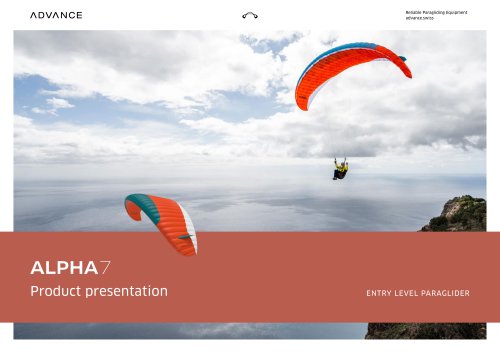
Catalog excerpts

Getting Star ted advance thun ag uttigenstrasse 87 ch 3600 thun info@advance.ch support@advance.ch
Open the catalog to page 1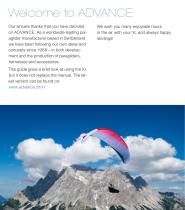
Welcome to ADVANCE Our sincere thanks that you have decided on ADVANCE. As a worldwide leading paraglider manufacturer based in Switzerland we have been following our own ideas and concepts since 1988 – in both development and the production of paragliders, harnesses and accessories. This guide gives a brief look at using the XI, but it does not replace the manual. The latest version can be found on: www.advance.ch/xi We wish you many enjoyable hours in the air with your XI, and always happy landings!
Open the catalog to page 2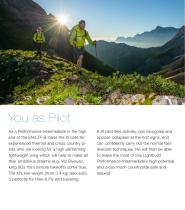
You as Pilot As a Performance-Intermediate in the high end of the EN/LTF-B-class the XI calls for experienced thermal and cross country pilots who are looking for a high performing lightweight wing which will help to make all their ambitious dreams (e.g. Vol Bivouac, long XCs from remote takeoffs) come true. The XI’s low weight (from 3.4 kg) also suits it perfectly for Hike & Fly and traveling. A XI pilot flies actively, can recognise and oppose collapses at the first signs, and can confidently carry out the normal fast descent techniques. He will then be able to make the most of this...
Open the catalog to page 3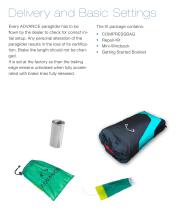
Delivery and Basic Settings Every ADVANCE paraglider has to be flown by the dealer to check for correct initial setup. Any personal alteration of the para lider results in the loss of its certificag tion. Brake line length should not be changed. It is set at the factory so than the trailing edge remains unbraked when fully accelerated with brake lines fully released. COMPRESSBAG Repair-Kit Mini-Windsock Getting Started
Open the catalog to page 4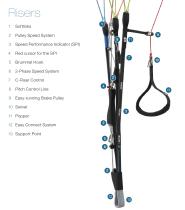
Risers 1 Softlinks 2 Pulley Speed System 3 Speed Performance Indicator (SPI) 4 Red cursor for the SPI 5 Brummel Hook 6 2-Phase Speed System 7 C-Riser Control 8 Pitch Control Line 9 Easy-running Brake Pulley 10 Swivel 11 Popper 12 Easy Connect System 13 Support Point
Open the catalog to page 5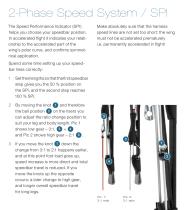
2-Phase Speed System / SPI The Speed Performance Indicator (SPI) h elps you choose your speedbar position. In accelerated flight it indicates your relationship to the accelerated part of the wing’s polar curve, and confirms symmetrical application. Make absolutely sure that the harness speed lines are not set too short: the wing must not be accelerated prematurely i.e. permanently accelerated in flight! Spend some time setting up your speedbar lines correctly: 1 Set their lengths so that the first speedbar step gives you the 50 % position on the SPI, and the second step reaches 100 % SPI....
Open the catalog to page 6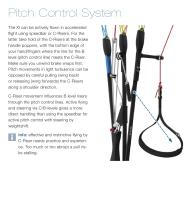
Pitch Control System The XI can be actively flown in accelerated flight using speedbar or C-Risers. For the latter take hold of the C-Risers at the brake handle poppers, with the bottom edge of your hand/fingers where the line for the B level (pitch control line) meets the C-Riser. Make sure you unwind brake wraps first. Pitch movements in light turbulence can be opposed by careful pulling (wing back) or releasing (wing forwards) the C-Risers along a shoulder direction. C-Riser movement influences B level risers through the pitch control lines. Active flying and steering via C/B-levels...
Open the catalog to page 7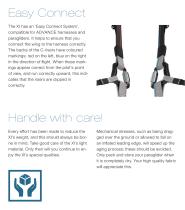
Easy Connect The XI has an ‘Easy Connect System’, compatible for ADVANCE arnesses and h paragliders. It helps to ensure that you connect the wing to the arness correctly. h The backs of the C-risers have coloured markings: red on the left, blue on the right in the direction of flight. When these markings appear correct from the pilot’s point of view, and run correctly upward, this indicates that the risers are clipped in correctly. Handle with care! Every effort has been made to reduce the XI’s weight, and this should always be borne in mind. Take good care of the XI’s light material. Only...
Open the catalog to page 8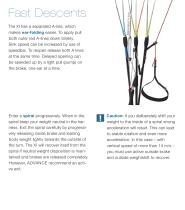
The XI has a separated A-line, which makes ear-folding easier. To apply pull both outer red A-lines down briskly. Sink speed can be increased by use of speedbar. To reopen release both A lines at the same time. Delayed opening can be speeded up by a light pull (pump) on the brake, one ear at a time. Enter a spiral progressively. When in the spiral keep your weight neutral in the harness. Exit the spiral carefully by progressively releasing inside brake and leaning b ody weight lightly towards the outside of the turn. The XI will recover itself from the spiral if neutral weight disposition...
Open the catalog to page 9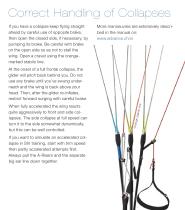
Correct Handling of Collapses If you have a collapse keep flying straight ahead by careful use of opposite brake, then open the closed side, if necessary, by pumping its brake. Be careful with brake on the open side so as not to stall the wing. Open a cravat using the orangemarked stabilo line. More manoeuvres are extensively des ri c bed in the manual on: www.advance.ch/xi If you want to simulate an accelerated collapse in SIV training, start with trim speed then partly accelerated attempts first. Always pull the A-Risers and the separate big ear line down together. When fully accelerated...
Open the catalog to page 10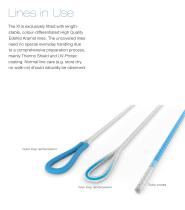
Lines in Use The XI is exclusively fitted with length- stable, colour-differentiated High Quality Edelrid Aramid lines. The uncovered lines need no special everyday handling due to a comprehensive prepa ation process, r mainly Thermo Shield and UV-Protec c oating. Normal line care (e.g. store dry, no walk-on) should naturally be observed. Outer loop reinforcement Inner loop reinforcement Twice coated
Open the catalog to page 11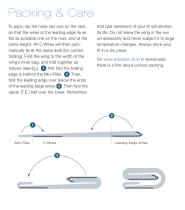
Packing & Care To pack, lay the nose ribs one on the next, so that the wires at the leading edge lie as flat as possible one on the next, and at the same height. All C-Wires will then automatically lie at the same level (for correct folding). Fold the wing to the width of the wing’s inner bag, and fold together as follows (see fig.): first fold the trailing edge in behind the Mini-Ribs. Then fold the leading edge over below the ends of the leading edge wires. Then fold the upper (T.E.) half over the lower. Remember that bad treatment of your XI will shorten its life. Do not leave the wing...
Open the catalog to page 12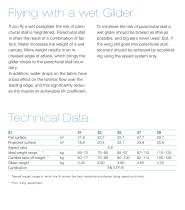
Flying with a wet Glider If you fly a wet paraglider the risk of parachutal stall is heightened. Parachutal stall is often the result of a combination of factors. Water increases the weight of a wet canopy. More weight results in an increased ngle of attack, which brings the a glider closer to the parachutal stall boun dary. In addition, water drops on the fabric have a bad effect on the laminar flow over the l eading edge, and this significantly reduces the maximum achievable lift coefficient. To minimise the risk of parachutal stall a wet glider should be braked as little as p ossible,...
Open the catalog to page 13All ADVANCE Thun AG catalogs and technical brochures
-
ALPHA 7
22 Pages
-
PIBI
4 Pages
-
PROGRESS 3
18 Pages
-
IMPRESS 4
25 Pages
-
PI 3
15 Pages
-
ADVANCE BIBETA 6
19 Pages
Archived catalogs
-
BIPAX
2 Pages
-
BIPRO 3
37 Pages
-
LIGHTNESS 3
55 Pages
-
STRAPLESS 2
10 Pages
-
EASINESS 3
43 Pages
-
AXESS 4
39 Pages
-
SUCCESS 5
36 Pages
-
PROGRESS3
12 Pages
-
PI3
19 Pages
-
EPSILON 9
19 Pages
-
ADVANCE SIGMA 10
17 Pages
-
EPSILON 8
20 Pages
-
ALPHA 6
18 Pages


